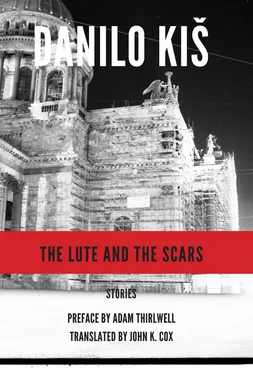18
If it hadn’t been for the papers (the stateless one read them early in the mornings, in the hotel restaurant) and their talk of armaments, of the dizzying increases in prices and unemployment, of diplomatic negotiations and anxious urgency, one could have believed, here in Amsterdam, that one still dwelled in the good old Europe of yore, and that the threat of war, Munich, the Reichstag fire — that they were all just nightmares and apparitions of a sick imagination. Mr. van der Lange, his publisher, a man with a jutting lower jaw and calm, gentle eyes (as if the bottom of his face were separated from the upper part by centuries of civilization), conversed with him over cognac and coffee, as if the two of them inhabited some island together. Mr. van der Lange was very well informed about the situation in Germany, and in their conversation he evinced — in spite of all the strict discipline that supposedly consigns men of good upbringing and high culture to lives of self-control and sangfroid — no little concern over the fate of German culture and the future of the continent. As for those matters strictly related to business, he again took care of these with the politeness of a man both realistic and sober, and he put together a contract with the stateless one about which neither of the signa-tories could be dissatisfied. But when the other man laid out the “German situation” for him on the basis of his own experience, that is to say as a witness, Mr. van der Lange grew morose, like a person hearing something horrifically unpleasant and difficult to refute about his very own mother.
19
After that nervous and depressed Europe where the people were gathering in the streets to catch the words of orators and demagogues on the balconies, and where armies were goose-stepping through the cities while masses howled in the stadiums, the man without a country suddenly found himself in Amsterdam on that bright April day, as if in another world altogether. The market women offered their goods with voices that were hoarse but merry and betrayed no trace of anxiety; the housewives continued flipping the big wriggling fish at the stands; the young men rode around quite civilly on their bicycles, pushing the pedals slowly and steadily, spokes gleaming in the sun. Next to the marketplace stood a huge barrel organ, painted orange, looking like an elegant coach and cranking out a medley of songs. Two girls in traditional folk outfits, with their white kerchiefs and yellow wooden slippers, held out to pedestrians tin cans bearing the symbol of the Red Cross. Boats moved calmly along on the canals; on one of them multicolored laundry hung on the ropes to dry, and someone on deck was playing the harmonica as if trying to imitate a canary. Through narrow uncurtained windows families could be seen around tables with steaming dishes of food: bright accents on idyllic scenes of family life, the way they would have appeared on the canvas of a Dutch master.
20
Here in Amsterdam, in a lonely little street a stone’s throw from a canal, the man without a country looked up a fortune-teller one afternoon whose business was attracting attention with its over-the-top advertisements that no one could say were lacking in imagination: “What awaits you on the morrow? Only God and Satan know. And their pupil, Herr Gottlieb.” And so forth.
21
He walked through the door, then pushed aside a heavy plush curtain and found himself plunged into reddish twilight emanating from a lamp with a red shade, lying on its side. After he had scanned the room, which seemed empty to him, he felt somewhat disappointed, as if he were experiencing déjà vu , as if he had already seen all of this somewhere. Above all it was professional curiosity that brought him to this “premium fortune-teller”; he wanted to have a complete mental inventory of the scene in case he should ever need to evoke it. But right away, right at the door, it dawned on him that he should allow this “soothsayer” to decide his fate, since he had already exhausted all other means: the advice of friends, priests.
22
Now he was seated in a second-class compartment of an express train, thinking about what Mr. Gottlieb, the “premium fortune-teller,” had told him. The man’s statement reverberated unceasingly in his ears, formulated in passable German: “Paris is your last chance. Yes, yes. The last. ” Was he superstitious? No more and no less so than other people. If he had been told this earlier, two or three years ago, he would not have paid any attention to it.
23
Capturing on paper, in haste, and with no explicit, patent goal, these miscreant humans, this freak show, the man without a country was aware of the fact that literature was playing a secondary role here, even as he also tried hard to pretend to himself that his interest was a purely professional one, and involved human phenomena; it will probably, he thought to himself, turn out to be more of an exorcism of some type, part of that phobia that prevented him from entering an elevator, of that dread of the unknown that literature can only make use of as an exorcism. Because, ultimately, if he should need such a figure, it would rise up from his memory, even before he pored over his notebooks and jottings, and what he was doing now was thus serving as a kind of amulet to ward off the evil eye, or malevolent destiny. For he needed health, and he needed life, a healthy and normal life, since his unfinished work still lay before him — everything else was subordinated to that thought. Everything else.
24
The stateless one left his hotel at five. In front of the doors to the building he stopped for a moment and looked first up at the sky and then at his watch. “The marquise went out at precisely five o’clock,” he noted to himself.
25
The blow came so fast, so unexpectedly, that our apatride couldn’t have felt anything save the penetrating pain on the crown of his head; and all at once daybreak lit up all around him, as if a thunderclap had struck in the vicinity; lightning flashed in his mind, illuminating with its fearsome and powerful tongue of fire his whole life, and immediately thereafter darkness must have descended. His limbs separated from his body, as if an invisible force had ripped them from his torso. (We can, by means of analogy, have a presentiment of this horrific sensation of a higher power pulling the limbs from our body: once upon a time you were rocking on a chair and the chair suddenly flipped over, and you found yourself lying with the crown of your head on the concrete floor while for a moment your hands and your feet seemed to be separated from your body, ripped out of their joints, and you lay for several seconds without moving on the ground, incapable of screaming because robbed of your voice.) This rapid flash of light, like the flame of a torch before a hard gust of wind extinguishes it once and for all, this illumination prior to complete obscurity — this is as far as we are capable of following the experiences of the man without a country. Further than this (as Mme Yourcenar would say), we cannot go. No such experience has ever been vouchsafed us. And we will never be able to experience such things.
26
You, dear sirs, would like for me to show you the house in which I was born? But my mother gave birth in the hospital at Fiume, and that building has been destroyed. And you won’t manage to put up a memorial plaque on my house, because it has probably been torn down, too. Alternately, you’d have to hang three or four plaques with my name on them: in various cities and various countries, but in this I could not be of assistance to you either, because I don’t know in which house I grew up; I no longer recall where I lived during my childhood; I barely even know anymore what language I spoke. What I do remember are images: swaying palms and oleander somewhere by the sea, the Danube flowing along, dark green, next to pastureland, and a counting rhyme: eeny, meeny, miny, moe .
Читать дальше












